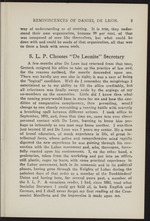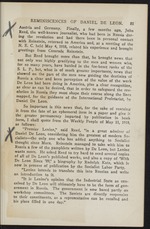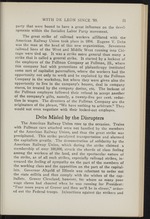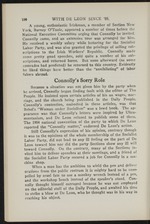| 1 |
 |
“...contact with De Leon, learning to know him per-
haps as intimately as one man may know another. I was then
just beyond 32 and De Leon was 7 years my senior. He a man
of broad education, of much experience in life, of great in-
tellectual force, whose active and comprehensive mind rapidly
digested the new experience he was gaining through his con-
nection with the Labor movement and, who, thereupon, force-
fully reacted upon his environment. I, on the other hand, a
proletarian, taken from the workshop and put into an office,
still plastic, eager to learn, with some practical experience in
the Labor movement, both in its economic and in its political
phases, having gone through the Knights of Labor during the
palmiest days of that order as a member of the Bookbinders
Union and having been, for several years past, a member of
the S. L. P. A voracious reader, I had, since 1883, read what
Socialist literature I could get hold of, in both English and
German, and I shall never forget my first reading...”
|
|
| 2 |
 |
“...wants more. He asked Reed to try hard to send several copies
of all of De Leon s pubHshed works, and also a copy of 'With
De Leon Since 89, a biography by Rudolph Katz, which is
now^ in process of publication by the Socialist Labor Party.
^ Lenine intends to translate this into Russian and write
an introduction to it.
_ "It is Lenines opinion that the Industrial State as con-
ceived by De Leon will ultimately have to be the form of gov-
ernment in Russia. The government is now based partly on
workshop committees. The Soviets are directly responsive
to their constituents, as a representative can be recalled and
his place filled in one day....”
|
|
| 3 |
 |
“...at the head of this new organization. Seventeen
railroad lines of the West and Middle West running into Chi-
cago were tied up. It was a strike more general than many a
strike that is called a general strike. It started by a lockout of
the employes of the Pullman Company at Pullman, 111., where
this company had with pretentions of philanthropy instituted
some sort of capitalist paternalism, where the workers had the
opportunity not only to work and be exploited by the Pullman
Company in the workshop, but where they were given also the
opportunity to live in the companys houses, deal in company
stores, be treated by the company doctor, etc. The lockout of
the Pullman employes followed their refusal to accept another
of the company s gifts, namely, a twenty-five per cent, reduc-
tion in wages. The directors of the Pullman Company are the
originators of the phrase, "We have nothing to arbitrate. They
would not even negotiate with their locked-out employes.
Debs Misled by the Disrupters
The...”
|
|
| 4 |
 |
“...did not lead to any ill feeling on the part of De
Leon toward him nor did the party Sections show any ill will
toward Connolly. On the contrary, many of the Sections in-
vited him to deliver speeches at their meetings, and a friend of
the Socialist Labor Party secured a job for Connolly in a ma-
chine shop.
When a man has the ambition to wield the pen and deliver
orations from the public rostrum it is mighty hard to be com*
pelled by cruel fate to use a monkey wrench instead of a pen,
and the workshop bench instead of the speakers stand. Con-
nolly thought himself outraged because he was not employed
on the editorial staff of the Daily People, and awaited his time
to strike a blow at De Leon, who he thought was in his way in
reaching his object....”
|
|
